TED2025 Behind The Scenes: The Eric Schmidt Quote, Palmer's Drone and 1X's NEO. Plus, LucasFilm's first foray into Generative AI.
From watching TED talks buffer on ISDN to curating them on the red circle. Behind the scenes look at my experience curating & hosting the flagship TED conference.
In 2023, I gave my first TED talk. In 2024, I hosted The TED AI Show. This year, I have the privilege of serving as TED’s technology curator — and hosting my own session at TED2025.
A lot happened on the red circle this year. Here’s a look at what it was really like to curate the TED stage — from a precarious robot opening to the Eric Schmidt quote you won't see on YouTube. Plus, a look ahead to TEDNext.

⚡️ TL;DR Summary
My focus? Putting the T back into TED – focused on tech curation & co‑hosting for TED2025 and TEDNext.
Curated 10 main‑stage talks featuring leaders from Anduril, Lucasfilm, Roblox, Android XR, Secret Level and more; hosted Session 3 and interviewed Eric Schmidt.
Drove both the physical and digital opening for TED2025 — complete with humanoid robots and (of course!) 3D Gaussian Splatting.
Joined by 6 other fantastic guest curators — each bringing unique visions to TED’s stage.
Leveraged my unusual blend as a technologist and creator mapping the frontier of creation, computing, and culture.

0→1 TED Opening (Physical & Digital)
“It’s time for TED!” — proclaims Chris Anderson in his iconic vest jacket — at the start of the annual TED conference. For what many consider to be the pinnacle of live events and conferences the bar is high for kicking things off every year.
Physical Opening:
This year Chris *really* wanted robots — and 1X robotics delivered — bringing their humanoid robot NEO to take over as “the new steward of TED.” Voiced by the iconic Yung Gravy, it was an absolute crowd pleaser.
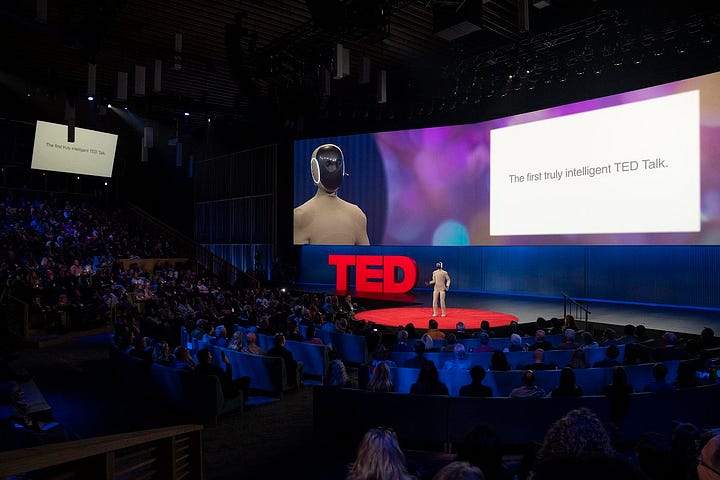

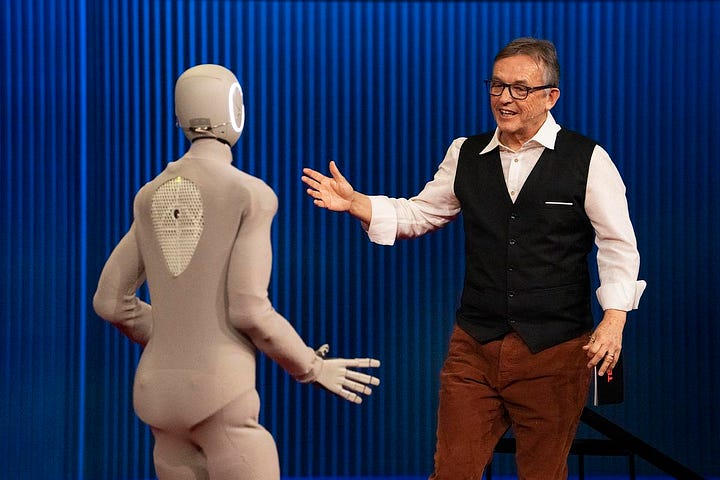
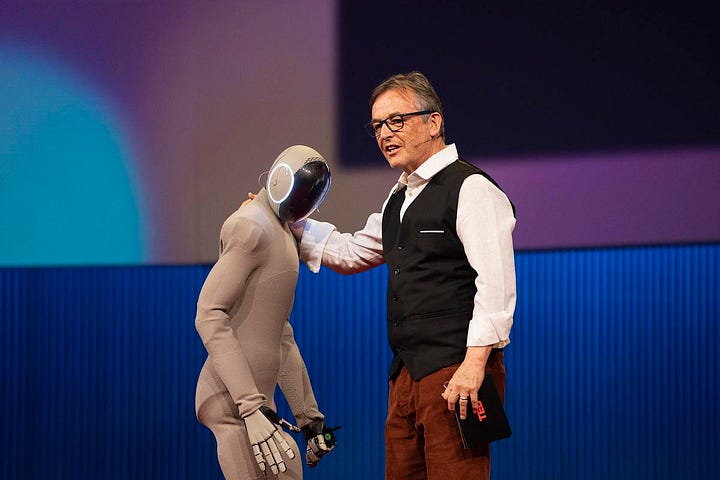
Huge shout out to Dar Sleeper, Bernt Bornich and the entire 1X team for being amazing partners. Check out the surprise opening in video form here:
Now what you won’t see online is how precarious the robot demo was (the leash, the streaming challenges, error messages popping backstage as the entire audience’s wireless signals hit the robot 😅). Luckily, the demo gods were exceedingly kind and everything landed beautifully.
Digital Opening:
As a kid buffering YouTube videos with an ISDN connection, TED talks were my portal to the future — seeing concepts like Pranav Mistry’s sixth sense come to life years before we’d see this tech hit the market.
So when I was asked to envision the opening video for TED2025, the vision was clear. My concept focused on TED’s prescient moments, the narrow path we walk between utopian and dystopian futures, and our agency to choose what comes next.
To execute this concept, I brought in my creator friends Don Allen III, Paul Trillo and the amazing team at Asteria — and they absolutely crushed it delivering a stellar opening video in record time.
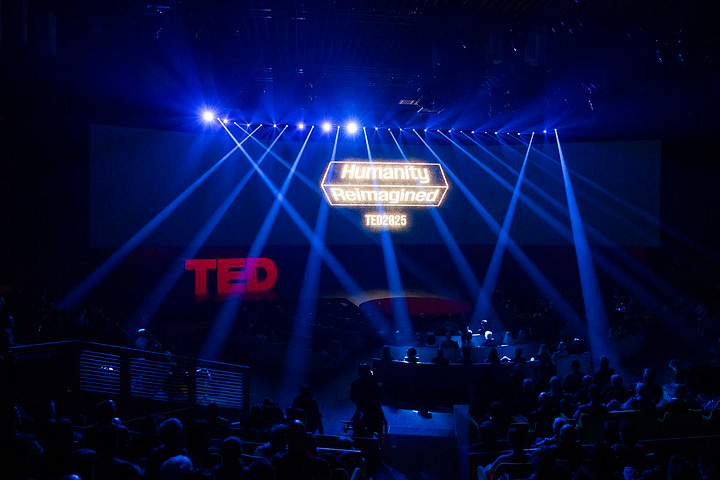
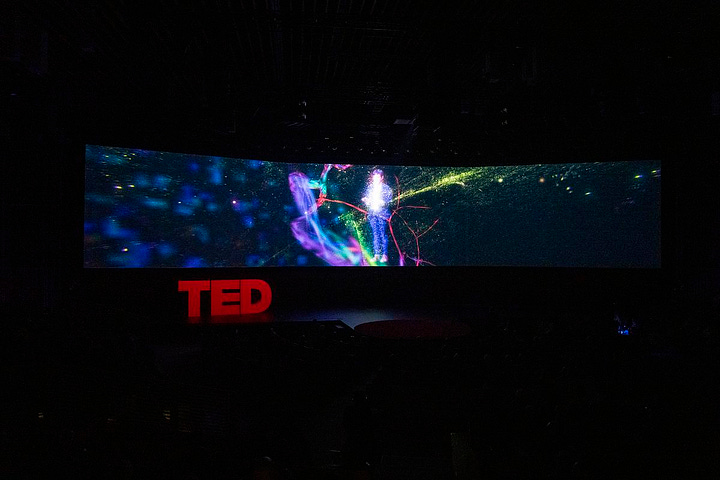
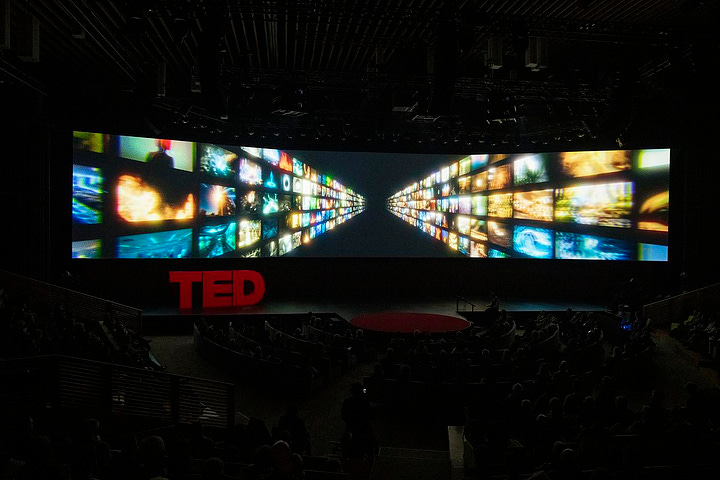
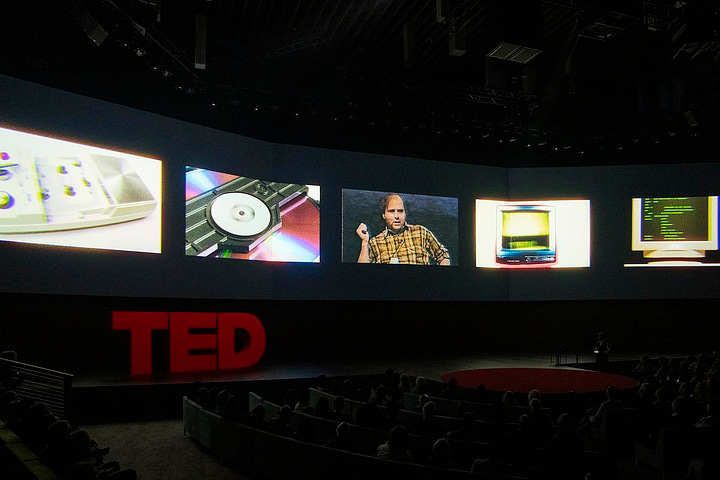
If you want to get a glimpse into the behind the scenes process, check out their VFX breakdown here. From 3D gaussian splatting to their own video model (called Moonvalley) and of course good old fashioned visual effects.
My TED Curation Strategy:
If I could boil it down to one phrase, it would be the dual-use nature of technology. It’s such a wild time to be a human — we've got intelligent machines amplifying human potential, reshaping art, redefining security, and rewriting reality itself. AI, XR, and robotics are blurring the lines between reality and imagination.
I wanted to curate a set of speakers that are on the forefront of blending the physical and digital worlds — driven by tech that is as powerful as it is provocative. But it’s not just about technology — it's about the next chapter of humanity, written by those who dare to redefine it.
1. Fireside chat with Eric Schmidt
As an ex-Googler, a particular treat was curating Eric Schmidt’s first TED talk — and sitting down with him on the red circle for a conversation about decisions, dilemmas and dreams surrounding AGI.
We covered a lot of ground — from autonomous agents and open source to geopolitics, national strategy, and what it even means to stay human in age of non-human intelligence.
Eric has long been a force at the intersection of tech and global policy — a rare leader who can speak fluently to engineers, heads of state, and Burning Man technologists alike.
What struck me most was his clarity, conviction, and willingness to name the hard truths about power, control, and sovereignty in the age of AGI.
There was a fun moment early in our exchange — a personal aside, lightly edited out you can enjoy in the video below — when Eric said:
There was a fun, candid moment early in our exchange—lightly edited out of the final video—when Eric said:
“Just to be clear, you were a really good product manager. Why did you have to leave me?!” - Eric Schmidt, TED2025
It caught me off guard in the best way — a moment of warmth, and maybe even a little cosmic symmetry. A reminder of the arc from operator to curator, from execution to vision.
Optimization for YouTube is key, so the pre-convo pleasantries never make the final TED cut. But the live audience enjoyed it, and I won’t forget it.
As Eric and I walked off stage, Sam Altman walked on to the TED stage (many more stories to tell, perhaps in a future edition).
In terms of reception, the response in-person and online has been fantastic, with video racking up millions of views.
2. Hosting Session 3: I-Robot
Now onto the main stage session I curated and hosted on day 2 of TED2025. Here’s how it went down:
Bernt Børnich, 1X Technologies
We kicked off with robots — because of course we did. Bernt’s humanoid robot NEO wasn’t just technologically impressive; it was genuinely cool. Watching NEO move naturally across the stage was a glimpse into how embodied AI will soon become commonplace.
Palmer Luckey, Founder of Anduril
Next up was Palmer Luckey, who originally kickstarted the spatial computing revolution we’re still living through when he founded Oculus VR. At TED, he stepped on stage not just with his trademark Hawaiian shirt, but also with a vision (and an arsenal) that would put Tony Stark to shame.
Palmer didn’t shy away from difficult conversations: the ethical debates around autonomy in military technology, Silicon Valley’s changing attitudes toward defense, and his own vision for the U.S. Army’s IVAS (AR/VR) program. Love him or hate him, Palmer is at the forefront of rethinking global defense—and his TED talk showed us exactly why that matters.
Check out our on-stage Q&A at the end of Palmer’s TED talk:
Shahram Izadi, VP/GM XR at Google
Shahram Izadi then took us directly to the bleeding edge of blended reality, where digital and physical worlds become seamlessly intertwined.
As the VP and GM of XR at Google, Shahram demonstrated live on stage how immersive computing, enriched by AI, is rapidly transforming our relationship with technology and reality itself.
Even as we nervously invoked the "demo gods," Shahram calmly explained why this fusion of AI & XR isn't just cool — it’s genuinely profound for how we’ll soon experience our day-to-day lives. To that end, the examples Nishtha Bhatia and Max Spear shared really brought the whole experience to life.
Salome Agbaroji, U.S. National Youth Poet Laureate
Salome Agbaroji, the U.S. National Youth Poet Laureate, delivered something special — words that resonated deeply in a session full of groundbreaking technology.
Her 100% human generated poetry touched on humanity and agency in the age of AI. That yes, technology does shapes our future — but it's our humanity that defines it.
Her lyrical and evocative performance was a quintessentially human counterpoint to this technological duality we face. It is thus no surprise that she got a massive standing ovation from the TED audience.

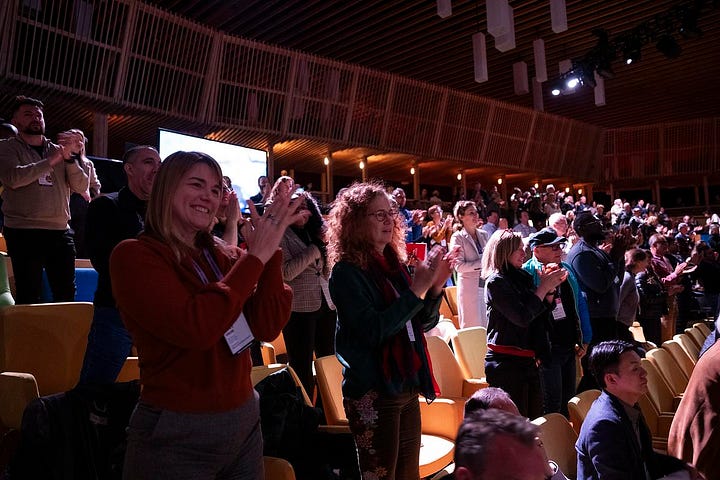
Kiran Bhat, Roblox
Next, Kiran Bhat from Roblox gave us an energetic look at the digital spaces where the next generation is literally growing up.
Instead of LAN parties or consoles, today's kids inhabit dynamic 3D worlds like Roblox — and as Kiran demonstrated, they're not just consuming these experiences, they're co-creating them.
Imagine a reality where kids can simply speak worlds into existence, collaboratively and creatively. Kiran’s demo was a live look at how generative AI can transform the metaverse from empty hype into vibrant community-built universes, full of wonder and possibility.

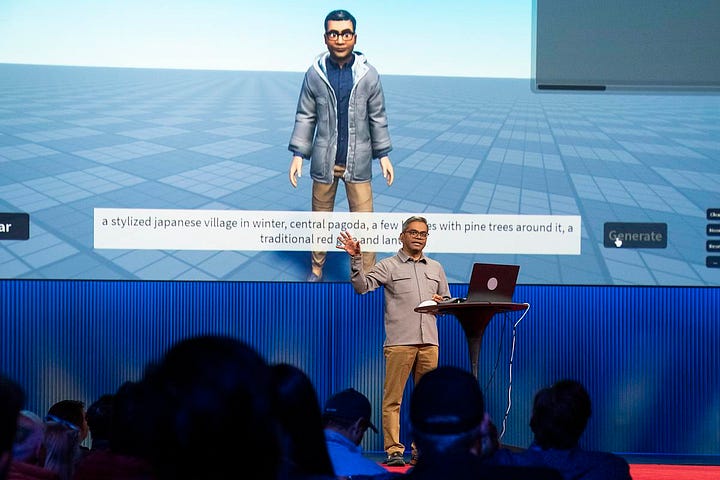
Peter Wilczynski, Maxar Technologies
Peter Wilczynski from Maxar Technologies brought us back down to Earth—literally. Tasking satellites in orbit to image our venue and city in real time was just the beginning.
Peter's work underscores the vital importance of having a dynamic and accurate real-time map of our planet, from environmental monitoring to urban development and geopolitical hotspots.
As digital and physical realities converge, he showed us why satellite imagery isn't just about pretty pictures from space — it’s crucial infrastructure for a rapidly evolving world.

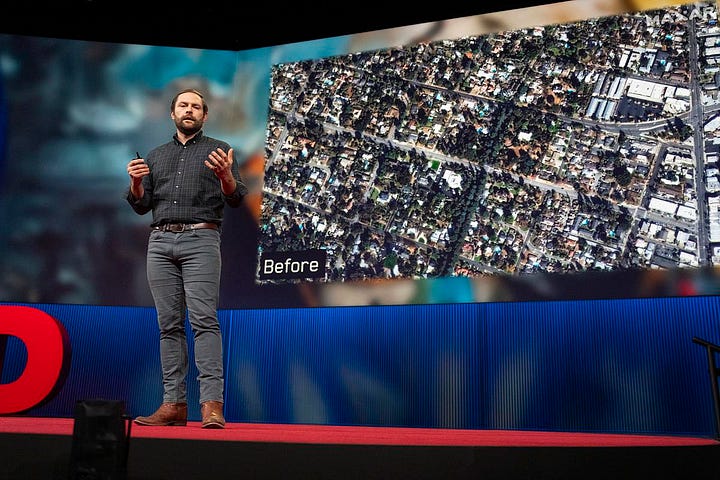
Rob Bredow, Lucasfilm and Industrial Light & Magic
Finally, I had the personal honor of introducing Rob Bredow from Lucasfilm and Industrial Light & Magic. As a kid, visual effects captured my imagination — especially that unforgettable alien mothership scene in Independence Day. Well, Rob was behind that very spectacle.
Bringing him on stage felt like a full-circle moment, connecting my earliest creative inspiration with my current journey. Rob closed our session by masterfully showing us how AI is redefining creative boundaries in visual storytelling.
For everyone who grew up inspired by cinema’s magic, Rob’s talk was a perfect finale, a reminder that the intersection of technology and creativity is endlessly rich and exciting.
3. Hosting Dinners & Curating Conversations
Meta was a key sponsor of TED this year, and I was invited to host their private TED Tech dinner — an annual event started by the amazing Simone Ross where we pull together the techies in our community.
Meta brought everyone a pair of Rayban Meta glasses and curated a delicious multi-course meal with suggested prompts to make the most of the experience.
I also enjoyed hosting the 200 person dinner for the broader TED community — moderating a multi-stage convo about the big philosophical questions surrounding AI.
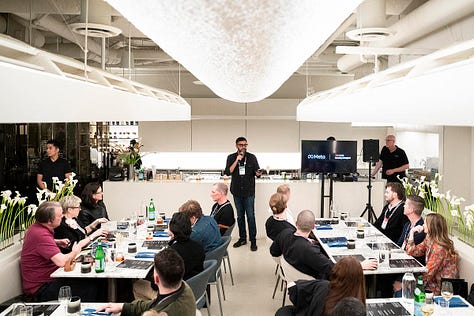
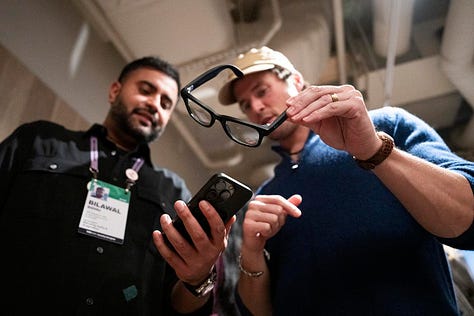
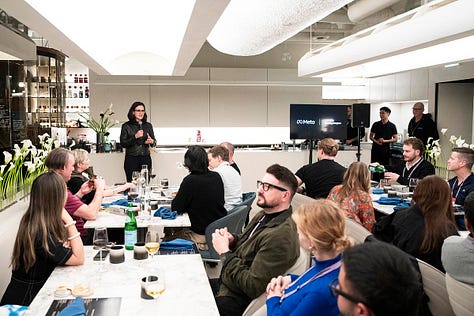
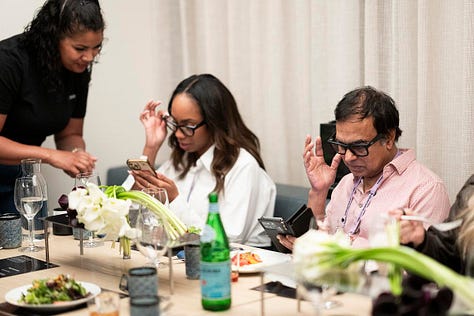


4. Curating Science & Creativity
Beyond my main session, I also curated three other speakers pushing the boundaries of AI in creation and discovery.
Matan Cohen-Grumi, Founding Creative Director of Pika Labs shared his journey from rockstar to AI creator, showing how AI brings VFX to the hands of consumers. His message: it's not just about utility, but sheer delight.
Jason Zada, Co-Founder of Secret Level redefined real-time creativity by taking prompts from the TED audience and creating a 3-minute AI film in just 2 days, pushing Google Veo to its limits.
Eric Nguyen, Stanford PhD student delivered the most profound talk. His team taught AI to generate DNA with EVO — "ChatGPT for DNA" — creating the world's first AI-designed CRISPR system.
As he put it: "For centuries, we've studied life by observing and dissecting it, but now we're no longer just reading Life's Code. We now have the power to generate it." His provocative question: "Why try to bring back extinct species when we can create new ones?"
From democratizing creativity to redefining cinema to rewriting life itself. The dual-use nature of technology has never been more apparent.
✨ Concluding Thoughts
That little kid sitting on YouTube, watching TED talks through a laggy ISDN connection could’ve never imagined that one day I’d give a TED talk, let alone curating and hosting them.
Immense gratitude to TED’s incredible team — especially Chris Anderson, Helen Walters, Cindy Stivers, and Whitney Pennington Rodgers — for trusting me with this platform. And to my fellow guest curators — thank you for your camaraderie and insights.
I’ve kicked off curating speakers for TEDNext 2025. If there’s a brilliant voice you’d like to nominate for consideration, hit reply to this email and let me know.
Enjoying the map?
Hit Subscribe ← it’s how we keep mapping the frontier of creation & computing together.
Let me know in the comments — which TED talk did you enjoy the most? Which speaker’s ideas do you want unpacked in greater depth?
Cheers,


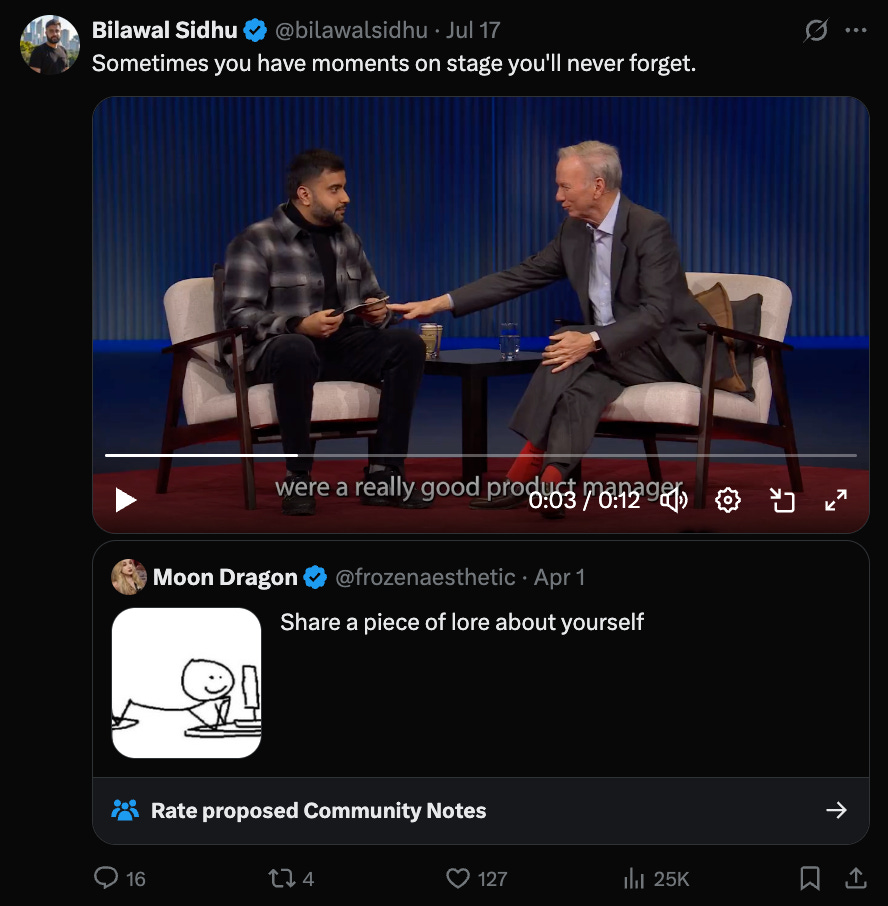


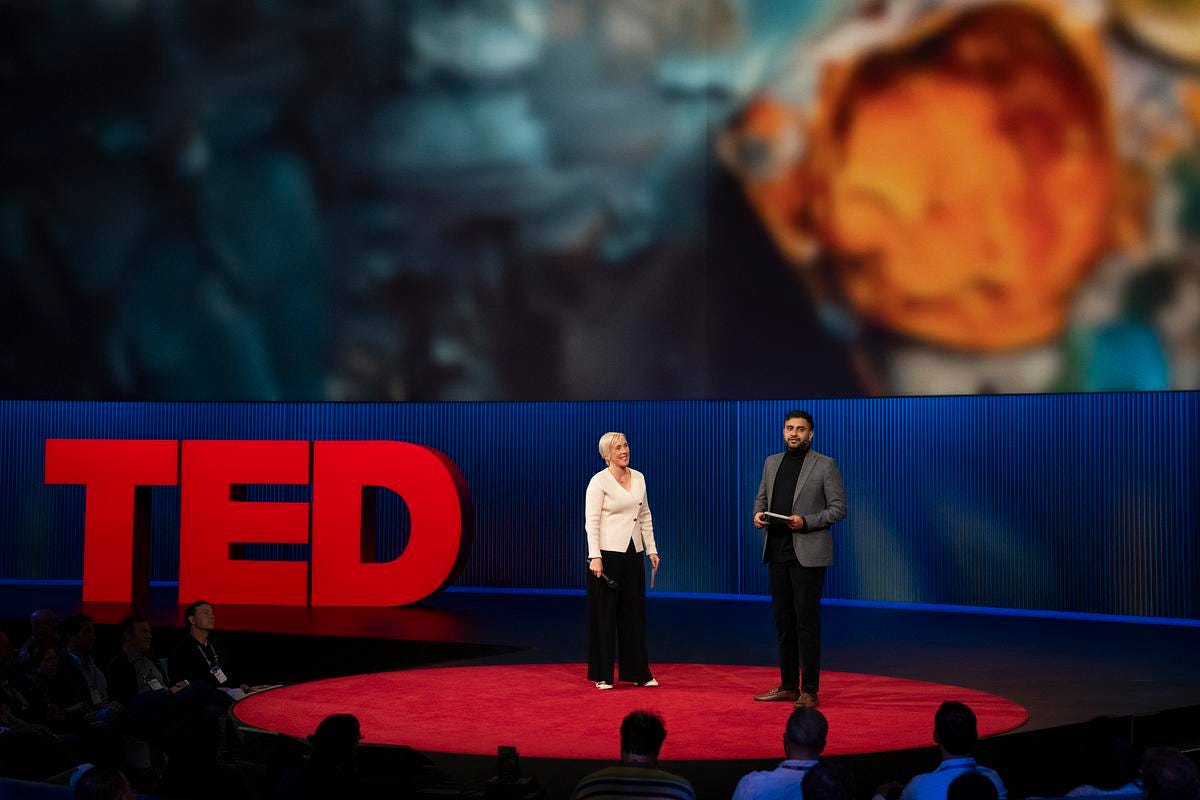

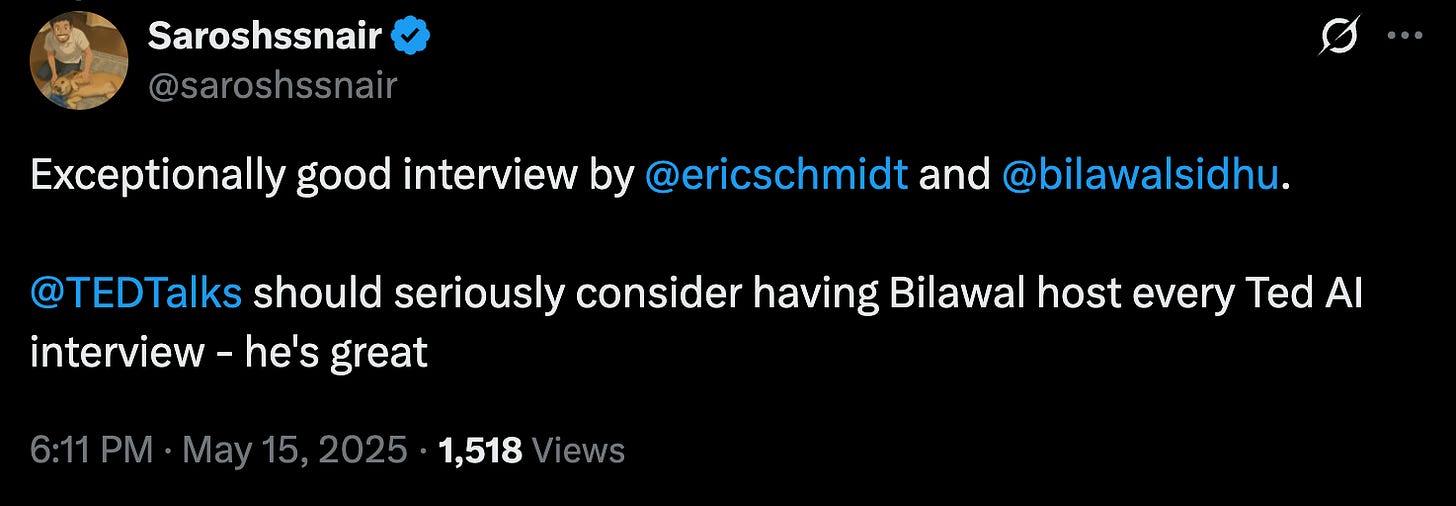

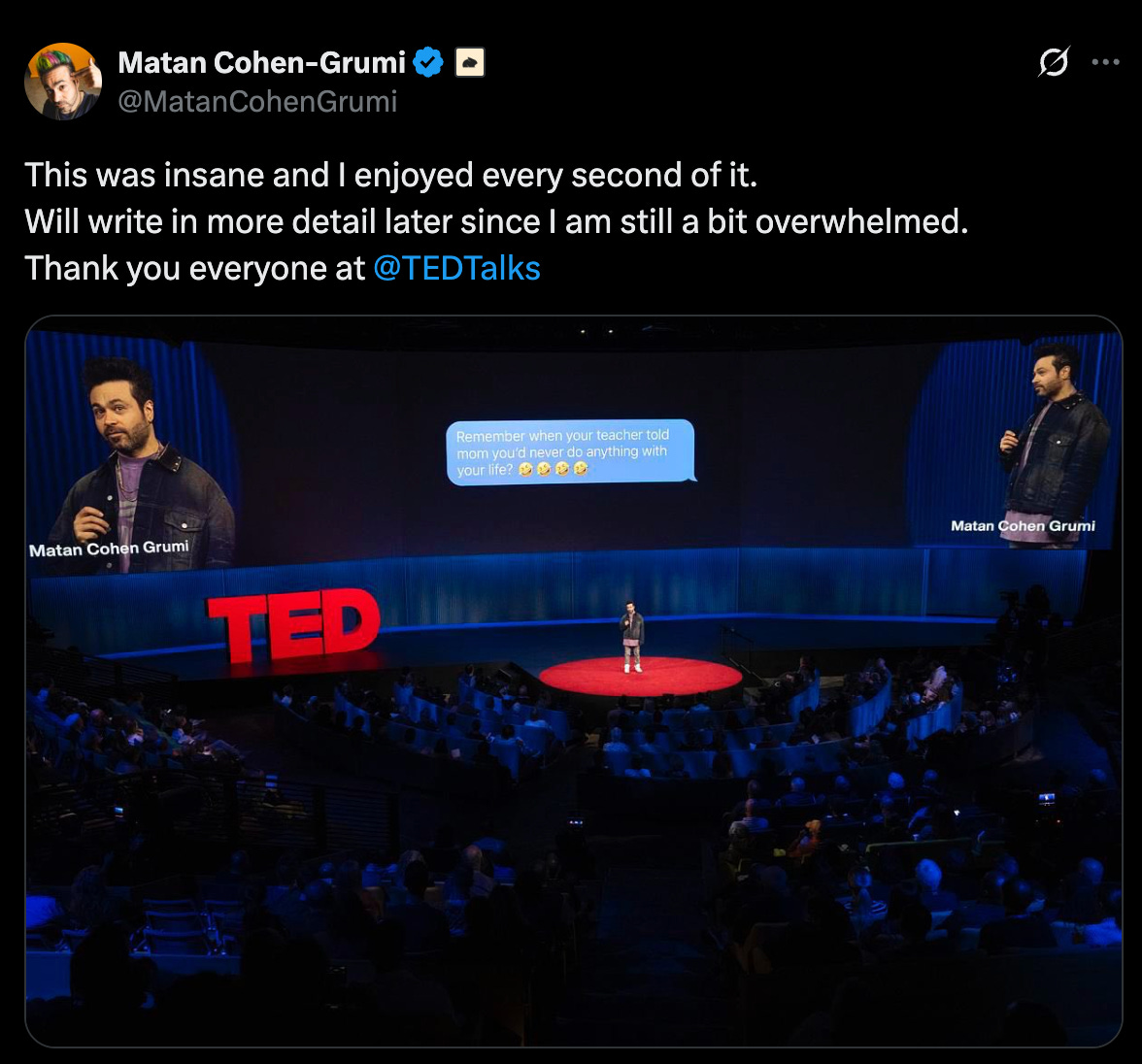



Amazing energy, coverage and impact. Bravo! And what a time to be a leading voice in tech.